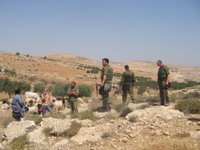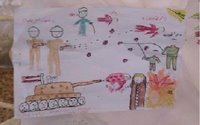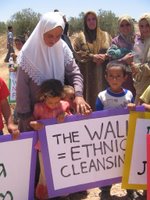Maintaining Normal Life
 As Israel’s wars in Lebanon and Gaza rage, people in At-Tuwani attempt to maintain “normal” life.
As Israel’s wars in Lebanon and Gaza rage, people in At-Tuwani attempt to maintain “normal” life.(picture of a man and his son waiting for a donkey to come get their bags that they carried off their tractor. The man and his son were coming back from Yatta on the day that the soldiers placed blocks along the road, trapping his tractor on the other side of the wall from At-Tuwani.)
 We asked one of the leaders in the village what the village wants to do in response to the concrete blocks that the army recently placed blocking At-Tuwani’s access to much of the West Bank. The villager replied, “Nothing. There are many things going on in the village right now… Like, people are getting married.”
We asked one of the leaders in the village what the village wants to do in response to the concrete blocks that the army recently placed blocking At-Tuwani’s access to much of the West Bank. The villager replied, “Nothing. There are many things going on in the village right now… Like, people are getting married.”(picture= groom giving the bride jewelry at a pre-wedding party for the women of the families.)
He went on to say that the village is also a little wary of protesting the wall right now because the Israeli’s army’s response may be very violent. Because all of the media is focused on the north, the army and settlers have a bit more freedom to terrorize Palestinians right now without the world watching. Also, he said, many phone calls and letters to the commander about the blocks will just get lost among the many responses to Israel’s current wars. So… the village is trying to “lay low” and avoid the wrath of Israel at this point in time.
 The villager’s reply that “people are getting married” contains so much wisdom. “Normal” life for Palestinians here is resistance. There have been 3 weddings over the past 3 weeks. Each wedding is a weeklong party. Basically, we have been partying for the past 3 weeks- dancing & drinking tea until the wee hours of the night. The last 2 weddings occurred after the army blocked the road to Yatta. Both of these weddings were between men from At-Tuwani and women from Yatta. The brides had to ride in cars over large dirt mounds that the army has placed in the road between Yatta and At-Tuwani. Then the cars from Yatta dropped the brides off by the concrete blocks. They got out in their wedding dresses and squeezed between the blocks. The rest of
The villager’s reply that “people are getting married” contains so much wisdom. “Normal” life for Palestinians here is resistance. There have been 3 weddings over the past 3 weeks. Each wedding is a weeklong party. Basically, we have been partying for the past 3 weeks- dancing & drinking tea until the wee hours of the night. The last 2 weddings occurred after the army blocked the road to Yatta. Both of these weddings were between men from At-Tuwani and women from Yatta. The brides had to ride in cars over large dirt mounds that the army has placed in the road between Yatta and At-Tuwani. Then the cars from Yatta dropped the brides off by the concrete blocks. They got out in their wedding dresses and squeezed between the blocks. The rest of  the wedding parties walked up the hill to At-Tuwani and other cars came to pick up the brides on the At-Tuwani side of the blocks. This lack of freedom of movement is ridiculous. But people find ways to maintain some type of normalcy despite it.
the wedding parties walked up the hill to At-Tuwani and other cars came to pick up the brides on the At-Tuwani side of the blocks. This lack of freedom of movement is ridiculous. But people find ways to maintain some type of normalcy despite it.(picture 1= bride and party entering a home in At-Tuwani for the final wedding party, picture 2= a child in At-Tuwani with henna on her head. Many of the women dyed their hair with henna for the weddings. They sleep with henna on under a plastic bag or scarf. In the morning, one's hair is red.)
Last week one of the men of the village was driving on the Israeli bypass road 317, the only way to get to Yatta and much of the West Bank now that At-Tuwani’s road is blocked. The police followed the villager back to At-Tuwani, took his license plate and took the villager to the police station. The police claimed that the license plate was an illegal Israeli tag. However, we have the tag on video tape. It is a Palestinian tag. Also, there is no other way for the man to travel now that the army blocked the road. Another man from the village traveled by foot and public taxi in the midday sun (which is very hot) to the police station to pay bail. When he arrived at the police station, the police said bail was 2000 shekels. The villager refused saying, “That is too much. I’ll pay 1000.” The police agreed to 1000 shekels. This sounds to me like there was no legal process going on? There was no official bail set, no paperwork- only a Palestinian man illegally detained and 1000 shekels handed over to the Israeli police.
So… the village of At-Tuwani and the nearby villages in the South Hebron Hills are cut off from their main market town and from most of the West Bank by a low wall. When the soldiers placed the blocks in the road, they said that Palestinians would now have to go down the settler road (which is very dangerous because of potential attacks by Israeli settlers) and around to a checkpoint before reaching Yatta. An At-Tuwani man was caught using the road, like the soldiers told him to do, and the police unofficially “arrested” him and made him pay 1000 shekels (a little over $200). At-Tuwani is a village of 150 people, no running water, electricity for 4 hours a day by a generator. They are suffering a severe drought and have very limited crops. Along with their livestock, they depend on buying and selling in Yatta.
The low wall and blocks do nothing for security. It makes one wonder if they are only meant to make life so difficult for Palestinian villagers that they eventually leave.
Thursday we were out on Khoruba Hill with a Palestinian shepherd. Israeli settlers got angry and called the army to come tell the shepherd to leave. The army came and we spoke with them for about 45 minutes (long enough to distract them from harassing the shepherd and to give the shepherd time to finish watering his sheep). One CPTer told the soldiers, “But this is Palestinian land.” The soldier said, “Yes, I guess it is… but the problem is that those people (the settlers) are very violent… they do not want the Palestinians here. Today they called us (the army), tomorrow they may call us… but eventually they will take matters into their own hands and be very violent… and the army and police will arrive too late.” Conversations almost identical to this one occur regularly. Soldiers regularly chase (or attempt to chase) Palestinians off Palestinian land. Then the soldiers tell us that they know it is Palestinian land but the settlers are "crazy" or "violent."
There is no law here. Well, on paper there is law. There is Israeli law, military law, international law… but when it comes down to it, Israel does what it likes. It has more weapons and billions of dollars from the U.S. It does not matter if the land is legally Palestinian or Israeli. Israeli settlers decide to steal land from Palestinians and the Israeli army often protects them while they do it. It is illegal under every law and people recognize its illegality, but lawlessness continues...
Woe to those who make unjust laws,
to those who issue oppressive decrees,
to deprive the poor of their rights
and withhold justice from the oppressed of my people,
making widows their prey and robbing the parentless.
What will you do on the day of reckoning,
when disaster comes from afar?
To whom will you run for help?
Where will you leave your riches? (Isaiah 10:1-3)






